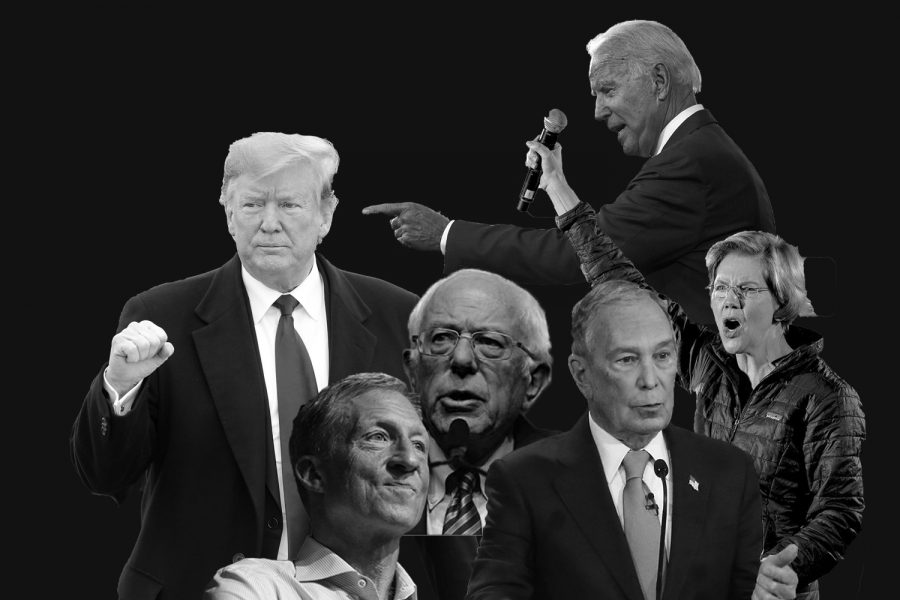Super Tuesday
Guide to the 2020 Democratic primaries
Photo by Margaret
March 2, 2020
Super Tuesday is fast approaching and is the first opportunity for many high school seniors around the country to make their voices heard through voting. On this day, the presidential primaries will be held in 14 states, will comprise of 40 percent of the U.S. population and about one-third of delegates will be up for grabs. This will be another step in the process of determining which two candidates will face off for the presidency at the end of Trump’s term.
On the Republican side, Donald Trump is running virtually unopposed for re-election. On the other hand, the Democrats have five candidates who are still in the running: Joe Biden, Mike Bloomberg, Tulsi Gabbard, Elizabeth Warren and Bernie Sanders. Before voting, it is important to at least have an idea of what you believe about the issues plaguing our country and also the candidates’ views on the issues. For those who need more information, here’s a guide to this year’s election:
Democratic Candidates
Joe Biden
Biden is a frontrunner in the Democratic Party, is widely known for serving as Vice President for former President Barack Obama and is one of the more moderate candidates in the Democratic Party. Biden is in support of keeping and building upon the Affordable Care Act (Obamacare) which is to be expected seeing as though he played a major role in its initiation. He also campaigns largely on rebuilding the middle class of America, claiming, “This country wasn’t built by Wall Street bankers and CEOs and hedge fund managers. It was built by the American middle class.”
Biden is among the many Vice Presidents who, after their term, have made a Presidential run. Historically, nine of them were successfully elected. Given that Obama is widely regarded as one of the most popular presidents in U.S. history, Biden started his campaign with a leg up. Biden won big in the South Carolina primaries on Saturday and hopes to have similar results on Tuesday.
Mike Bloomberg
Bloomberg was the mayor of New York, NY from 2002-2013, being elected shortly after September 11th, 2001. Bloomberg is a self-made multi-billionaire businessman and politician with an estimated net worth of $61.9 billion.
Bloomberg entered the race late and has only been able to participate in the last two debates. Although, he has spent roughly $410 million on ads in which he claims that he is the best candidate for the job of defeating Trump in his run for re-election.
Bloomberg is seen as a moderate candidate and is very vocal in his opposition towards Trump’s decision of pulling the U.S. out of the Paris Agreement. He often touts his record of expanding access to healthcare to 700,000 New Yorkers, and also supports “common-sense gun laws.”
In the most recent debates in South Carolina and Nevada, Bloomberg has been attacked by many on his history of “stop and frisk” policies and his non-disclosure agreements. Because of his history, many feel as though Bloomberg is simply the “Trump of the Democratic Party.” Despite this, Bloomberg still stands strong in the race and continues to fight for the Democratic nomination.
Tulsi Gabbard
Gabbard is a Representative from the state of Hawaii who is also a U.S. veteran. She is the first female combat veteran to ever run for president. She campaigns on ending wasteful wars and uniting the country. She is more progressive in some of her policies such as her “healthcare for all” plan, but she surprisingly garners support from moderate Republicans.
Gabbard, after being accused of being a Russian asset by last year’s Democratic nominee Hillary Clinton, responded by tweeting, “Great! Thank you @HillaryClinton. You, the queen of warmongers, embodiment of corruption, and personification of the rot that has sickened the Democratic Party for so long, have finally come out from behind the curtain. From the day I announced my candidacy, there has been a … concerted campaign to destroy my reputation. We wondered who was behind it and why. Now we know — it was always you, through your proxies and … powerful allies in the corporate media and war machine, afraid of the threat I pose.”
Gabbard has polled extremely low so far and only secured 3.3 percent of the vote in New Hampshire and 1.3 percent of the vote in South Carolina. Gabbard is not expected to have any possible chance at winning her party’s nomination. Even so, she continues to push on.
Elizabeth Warren
Warren served as special assistant to President Barack Obama for the Consumer Financial Protection Bureau and has been the senator of Massachusetts since 2012. She was born and raised in Oklahoma and went on to earn her J.D. from Rutgers University.
Early on, Warren boasted about her extensive plans for her proposed policies. She claims that she will cancel all student debt on her first day in office and has plans to provide universal tuition free public two- and four-year college and technical school, ban for-profit colleges from receiving federal aid, and help end racial disparities in college enrollment and resources. She is a proponent of supporting the middle class and she wants to take measures to protect the environment by creating a “green economy.”
Warren, similarly to Sanders, wants to transition to a “Medicare for All” system, claiming that the middle class taxes won’t be raised one penny. She also wants to raise wages for Americans in order to help with everyday costs.
Warren is a strong supporter of a woman’s right to choose whether or not she has an abortion. She was also one of the main attackers of Bloomberg on the debate stage, confronting him about his “stop and frisk” policies and his non-disclosure agreements which prompted Bloomberg to offer to release three women from these agreements.
Warren has polled poorly and only raked in 9.2 percent of votes from New Hampshire and 7.1 percent in South Carolina. Even in her own state, Sanders is in the lead in many polls. Warren is not a front-runner for the nomination, but she is still pushing forward.
Bernie Sanders
Sanders is currently serving as the senator of Vermont and has been since 2007. Sanders, along with Biden, is a frontrunner for the Democratic nomination. He ran for the nomination in 2016, but was defeated by Hillary Clinton.
Sanders is a major opponent of the big pharmaceutical companies; he wants to provide all Americans with free healthcare and plans to cut prescription drug prices in half. Sanders also has a plan to guarantee tuition and debt-free public colleges, universities, HBCUs, Minority Serving Institutions and trade-schools to all while also cancelling all current student loan debt.
Sanders plans on legalizing marijuana within his first 100 days in office by way of executive action; he then wants to expunge all past marijuana-related convictions. Afterwards, he wants to use the revenue collected from legal marijuana to invest in the communities that were hit hardest by the War on Drugs.
Up to this point, Sanders has polled nationally at an average of 29 percent and is most likely to secure the nomination for the Democratic Party. In the event that this comes true, many polls suggest that Sanders would overthrow Trump for the presidency.















